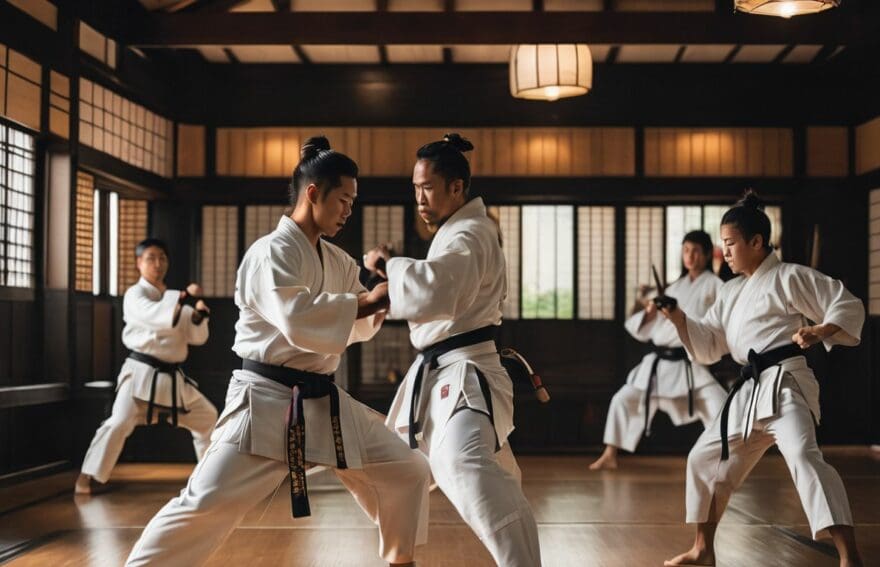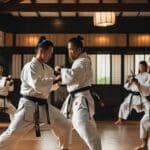The Philosophy of Fighting: Martial Arts Influence on the FGC

Updated On: November 29, 2025 by James Connolly
Ever felt that tingle of excitement when you recognise the echoes of martial arts discipline in the fervent world of fighting games? You’re not alone. We’ve shared that sense of wonder, observing how titles like Street Fighter embody the core tenets of hand-to-hand combat.
This piece unravels the subtle threads, showcasing how martial arts philosophy enriches players’ tactics within the Fighting Game Community (FGC). It’s about honing your skills and strategy to an art form, transcending simple button-mashing.
So why not join us as we delve into this intriguing convergence and elevate your gaming prowess?.
The History and Philosophy of Martial Arts in the FGC
The influence of traditional martial arts in the FGC runs deep, shaping the way players approach combat in fighting games. With a focus on self-control, respect for others, and constantly striving for improvement, martial arts philosophy has left a lasting impact on the fighting game community.
Influence of traditional martial arts on fighting games
We see the footprints of traditional martial arts in every high kick and precise punch within our favorite fighting games. Historical styles like Jujutsu and Wing Chun lend their fluid movements to the characters we control on-screen, shaping an immersive experience that echoes authentic combat.
These arts teach fighters about balance, timing, and strategy – elements vital for both ancient warriors and modern gamers aiming to master virtual battles.
Our skills sharpen as we adopt philosophies from disciplines such as Jeet Kune Do, which Bruce Lee made famous. This approach encourages adaptability and efficiency – traits essential for outmaneuvering opponents whether in a digital arena or a sparring session.
In this way, the wisdom passed down by martial artists enriches not just our gameplay tactics but also fosters a deeper respect for the cultural heritage embedded within each combo move we execute with precision.
Focus on self-control and respect for others
Martial arts philosophy places a significant emphasis on self-control and respect for others, instilling these values in both virtual and real-life combat. The principles of martial arts teach us to regulate our emotions and actions, promoting sportsmanship and fair play.
By maintaining self-discipline, we not only improve our gaming skills but also foster a positive environment within the fighting game community. This mindset promotes healthy competition while fostering a culture of mutual respect among players.
Incorporating these values from martial arts into the FGC can enhance the overall experience, creating an atmosphere where players strive for continual improvement while respecting their opponents.
The principle of constantly striving for improvement
Building on the focus on self-control and respect for others, it’s vital to acknowledge the principle of constantly striving for improvement in martial arts philosophy. This ideal encourages practitioners to consistently seek personal growth and skill enhancement.
It embeds a resilient mindset that champions perseverance and dedication. In the world of competitive gaming, this principle translates into continuous learning, refining strategies, and perfecting techniques.
Embracing this ethos opens up endless possibilities for advancement and mastery within both virtual combat arenas and real-life challenges.
The Role of Combat Sports in Fighting Games
Combat sports play a significant role in the development of fighting games, as they draw inspiration from real-life fighting techniques and strategies. There is ongoing debate within the FGC about whether pro gamers could excel in real-life fights, further blurring the lines between virtual combat and physical prowess.
Connection to real-life fighting techniques
Fighting games are often designed to emulate real-life fighting techniques, drawing inspiration from various martial arts styles. Pro gamers can benefit from understanding techniques found in combat sports like boxing, karate, or judo to excel in virtual combat.
Understanding the fundamental principles of authentic martial arts enables players to apply real-life tactics and strategies within the game environment. The mindset fostered by these techniques also supports mental fortitude and discipline, which is equally important in both virtual and physical combat scenarios.
Martial arts philosophy emphasises a strong mind-body connection, promoting self-defence alongside respect for opponents – values that seamlessly translate into the virtual arena.
Debate over whether pro gamers could excel in real-life fights
Combat sports have long been debated for their potential influence on pro gamers and whether they could transition their virtual skills to real-life fighting scenarios. While competitive gaming demands exceptional hand-eye coordination, quick reflexes, and strategic thinking, it remains uncertain if these attributes would seamlessly translate into physical combat proficiency.
Although the mental toughness and discipline required in both realms are comparable, combat sports training provides a unique physical element that traditional gaming does not offer.
This ongoing discussion raises questions about the correlation between digital expertise and practical martial arts abilities, leading to intriguing considerations about the diverse skill sets required in each discipline.
The Importance of Mindset in Martial Arts
Mental fortitude and discipline are crucial in training for martial arts, as it shapes the mindset of a fighter. Applying this mindset in both virtual and real-life combat helps players stay focused and composed under pressure.
Mental fortitude and discipline in training
Martial arts training demands mental fortitude and discipline. It requires the ability to push past physical and mental barriers, cultivating a warrior mentality that is crucial for success in both virtual combat in fighting games and real-life self-defence scenarios.
This mindset allows us to stay focused, maintain composure under pressure, and persevere through tough training sessions. The philosophy of martial arts encourages continual self-development, promoting the idea that one can always improve by building mental strength and maintaining a positive perspective throughout their journey.
The fusion of combat sports influence and traditional martial arts principles forms an eclectic approach to training, emphasising the mind-body connection essential for mastering techniques in various fighting styles.
Applying mindset in both virtual and real-life combat
Transitioning from mental fortitude and discipline in training, the mindset cultivated in martial arts is equally applicable to both virtual and real-life combat. In fighting games, maintaining focus, staying calm under pressure, and adapting quickly are essential for success.
Similarly, these traits are crucial in real-life combat situations where quick thinking and strategic decision-making can be a matter of life or death. The principles of respect for opponents and continual self-improvement learned through martial arts also translate seamlessly between the virtual arena and physical confrontations.
In virtual combat, strategising like a seasoned martial artist can lead to victory, just as it would in a real fight. Video game players who apply the philosophy of fighting not only enhance their gaming experience but may also find that the discipline they develop helps them approach challenges with confidence outside of gaming.
Lessons Learned from Martial Arts in the FGC
In the world of martial arts, self-control and sportsmanship are key values. As gamers, these principles can be applied to our interactions with opponents in the FGC. We can also learn to continually develop ourselves and show respect for others both on and off-screen.
Self-control and sportsmanship
Martial arts philosophy emphasises the importance of self-control and sportsmanship, instilling values that are crucial in both virtual and real-life combat. Demonstrating restraint and discipline during gameplay not only reflects a player’s character but also enhances their overall gaming experience.
In addition to this, showing respect for opponents is a key aspect of sportsmanship, contributing to a positive gaming environment where fair play is prioritised.
The principles of martial arts encourage continual self-development, which includes fostering self-control and understanding the value of sportsmanship. This mindset extends beyond fighting games, promoting constructive interaction within the gaming community and encouraging players to embody these qualities in their everyday lives.
Respect for opponents
Respecting one’s opponents is a crucial aspect of martial arts philosophy. It involves acknowledging the skills and dedication of others, regardless of the outcome. The concept of mutual respect helps to foster a positive and sportsmanlike environment within the fighting game community (FGC).
Respect for opponents not only promotes fair play but also contributes to personal growth by encouraging humility in victory and graciousness in defeat.
In the FGC, embodying respect for opponents can enhance the overall experience for everyone involved. It creates an atmosphere where players can learn from each other, build camaraderie, and strive towards continual improvement.
Continual self-development
Martial arts philosophy encourages continual self-development, promoting the idea of never-ending improvement. This concept is integral in the fighting game community, as players strive to enhance their skills and techniques continuously.
The ethos of martial arts inspires gamers to persevere and grow both within the virtual world of fighting games and in their personal lives. Embracing this principle fosters a mindset that values progress over perfection, encouraging individuals to learn from each experience and steadily advance their abilities.
Conclusion: The Enduring Influence of Martial Arts on the FGC
In conclusion, martial arts have left a lasting impact on the FGC community. Traditional martial arts principles such as self-control, respect for opponents, and continuous improvement have shaped the mindset of gamers.
The integration of combat sports techniques into fighting games has sparked debates about their real-life applicability. As the FGC continues to evolve, the philosophy and influence of authentic martial arts are likely to remain central to its culture and ethos.
FAQs
1. What is the influence of martial arts on the fighting game community (FGC)?
Martial arts shape the FGC by inspiring video games that reflect authentic fight culture and self-control, much like what is taught in eclectic martial art forms.
2. How do video games represent martial arts philosophy?
Video games frequently depict the mind-body connection central to martial arts philosophy, emphasising self-defence strategies and mixed martial arts techniques.
3. Are there real martial artists in fighting game history?
Yes, many video games within the FGC are inspired by or feature characters based on authentic martial artists, with moves grounded in true fighting principles.
4. Why is it important for gamers to understand real-life fighting philosophies?
Understanding actual fighting philosophies can help gamers improve their gameplay as they learn about self-control and discipline from mixed Martial Arts practices.


